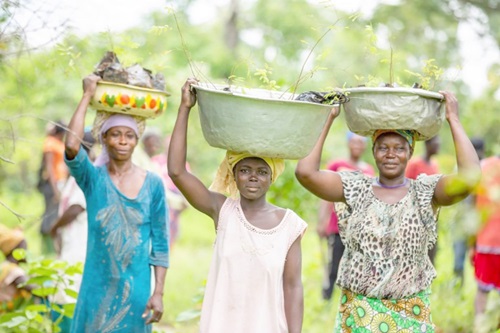
Applying the Golden Rule...Rights of indigenous peoples in Ghana, Africa and the globe
In the heart of Africa, where the vibrant rhythms of diverse cultures intertwine, lies the rich needlepoint of indigenous communities.
From the ancient Berber villages nestled among the rugged peaks of the Atlas Mountains to the serene homesteads of the San people, whose ancestral songs echo across the vast expanse of the Kalahari Desert, these communities embody the soul of our continent; and cradled in Ghana, the gateway to Africa are diverse groups of Indigenous Peoples who are a beautifully woven pattern in our identity as a People.
According to the United Nations, “Indigenous peoples are ethnic groups who are the original inhabitants of a particular geographic region, often predating the establishment of modern nation-states. They have distinct cultural, linguistic, social and economic characteristics that differentiate them from the dominant societies in which they live”.
Merging tradition
In Africa, and particularly Ghana, we have been able to successfully merge tradition with our adopted formal way of getting things done, especially traditional rule, alongside and embedded in contemporary governance at all levels.
Truly, Africa is the cradle of civilisation and has been the continent that can be described as having kept its culture and traditions post colonialism. Indigenous Peoples are the custodians of unique cultures, traditions and knowledge systems that are valuable to the fabric of our societies.
As custodians of Ghana's diverse cultural heritage, we bear a collective responsibility to uphold the rights and dignity of indigenous communities, recognising their intrinsic value and contributions to the nation's social, cultural and economic embroidery.
Do you know that in most parts of Africa, among Indigenous Peoples there are days dedicated to not “disturbing” nature? In Ghana, it is common knowledge amongst fisherfolk and farmers, depending on the traditional area and the culture of the people, that some days are dedicated to rest.
This practice, has transcended generations to our contemporary world today – the practical essence is that we are to protect the natural resources, for future generations. This is just one of the strategies we could adopt from Indigenous Peoples in our quest for sustainable development.
Yet, behind these examples of pragmatic approaches and customs of Indigenous Peoples that inure to the benefit of society; their traditions and customs have faced struggles, and yet, they have been resilient.
For generations, Indigenous Peoples have faced the harsh realities of marginalisation and displacement, their voices, often drowned out by the tumult of progress. So why have we not been intentional about the issues of Indigenous People?
We need to review our approaches to the inclusion of Indigenous Peoples and be guided by the Golden Rule principle; which is rooted in the teachings of different faith traditions, and underscores the importance of empathy, compassion, and mutual respect in promoting peace and harmony in our communities.
We must commit to treat others as we wish to be treated. The Golden rule serves as a beacon of hope and compassion. Ghana is leading the way. But we need to scale up. The chieftaincy system in Ghana is practical evidence of this remarkable feat.
As the leader and representative of my people as an indigenous group, I represent my people at the Local Government’s General Assembly, which is the highest decision-making body at that level) – thus giving us a voice to address our concerns.
Challenges
Despite progress made in recognising indigenous rights through legislative and policy reforms, significant challenges persist, casting shadows over the progress achieved. Land conflicts, stemming from competing claims and encroachments on ancestral territories, threaten to destabilise communities and erode cultural identities.
Inadequate representation in decision-making processes further marginalises indigenous voices, hindering their ability to shape policies that directly impact their lives and livelihoods. Addressing these challenges demands a concerted effort from all stakeholders, transcending political boundaries and societal divides.
It requires a comprehensive approach that combines legal reforms with community-driven initiatives aimed at empowering indigenous communities and amplifying their voices.
Strengthening mechanisms for land tenure security, ensuring equitable access to education and health care, and promoting cultural preservation and revitalisation efforts are essential steps towards building a more inclusive and equitable society where indigenous peoples can succeed and contribute meaningfully to the nation's development course.
Recognising our collective commitment to ensure the rights of Indigenous Peoples are protected, I call on all to brighten the light of hope for our People – let us commit to a brighter light that shines through the darkness they live in.
It is the hope that springs from the collective efforts of communities coming together to reclaim their rights and assert their presence. It is the hope that comes from the recognition of their inherent dignity and worth, a recognition that is long overdue.
Finally, let us reaffirm our commitment to stand in solidarity with Africa's indigenous peoples. Let us pledge to work tirelessly to ensure that the rights of Indigenous Peoples are not just recognised but celebrated, that their voices are not just heard but amplified; and we practically uphold the principles of equality, justice and respect for diversity.
Together, let us work towards a future where the rights of indigenous peoples are fully recognised, protected and promoted, ensuring peace, prosperity and dignity for all. This will probably be the most profound translation of the Agenda 2030 mantra: “Leave No One Behind”.
The writer is the Doliwura (Chief of Doli) of Kusawgu Traditional Area, Savannah Region
